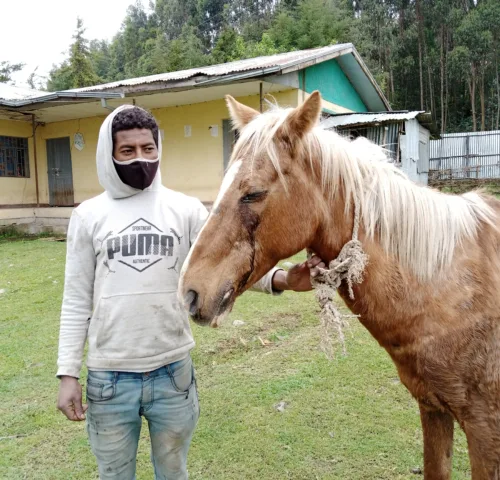Across the world, thousands of working animals are suffering from preventable eye problems due to the harsh climates and hazardous environments they live and work in. A scratch from a low-hanging branch or a small piece of dirt from a dusty road can – if left untreated – escalate into a serious infection and even lead to sight loss. These animals are often left alone and unable to work.
Thankfully, sight-saving treatment is possible. Your kind donation can enable our vet teams to act quickly and prevent minor and easily treatable eye problems from developing into debilitating illnesses. Your support can help equip SPANA centres and mobile clinics with vital sight-saving medication, allowing our dedicated vet teams to prevent suffering and save the sight of working animals.
A kind donation from you today can help prevent suffering and sight loss.
Obel’s story
Every day in Ethiopia, Obel the carthorse tirelessly hauls people and their goods to and from the market for six hours along busy, dusty and uneven roads.
In these conditions, it is easy for debris to enter a horse’s sensitive eyes. If it doesn’t leave the eye naturally, this can cause infection or other serious conditions. When Obel’s owner, Mengiste, noticed his horse’s left eye was looking painfully inflamed, he became deeply concerned.
Despite Mengiste’s best efforts to rinse Obel’s eye with water, the condition only worsened. Obel’s vision blurred as his sore eye continued to weep. He was in agony and disoriented, and risked stumbling as he pulled his cart over the cobblestone roads. He began frantically rubbing his face against his body to try to soothe his swollen eye.
Seeing the poor horse’s rapid deterioration, Mengiste took Obel to the SPANA mobile clinic for help. When our dedicated vets met Obel, the horse could barely keep his eye open. They carefully examined him and discovered he was suffering from a severe corneal ulcer, likely caused by dust, debris or ill-fitting equipment. Corneal ulcers are abrasions to the surface of the eye, which cause excruciating pain and, if left untreated, scarring, chronic inflammation, ruptures and eventual sight loss.
The team knew they needed to act fast to save Obel’s sight. After flushing his eye with saline, they gave the brave horse anti-inflammatories and antibiotics to treat the infection. The relief seemed almost immediate, as Obel became visibly calmer. Mengiste was advised to correct the position of Obel’s blinders to prevent rubbing against his skin. He was given anti-inflammatories to take home, and was shown how to gently apply the ointment until Obel was no longer at risk of losing his sight.
‘Thank you, SPANA. I was so worried about Obel. I knew that without treatment my horse may lose his eye.’ – Mengiste
Sadly, cases like this are far from unusual. In Ethiopia, ocular conditions are among the most common that our vets treat. This means our stocks of sightsaving medication need constant replenishing – especially in mobile clinics, where our vets must carry absolutely everything they need, as they can’t afford to run out in remote locations. We need your support to stop minor eye infections developing into chronic problems, disease and life-changing blindness.
Please, if you can, donate today and help save working animals from the agony of sight loss. Thank you.
Thank you
Your generous donations will be used for projects such as those featured in this appeal and where they are required the most to help animals in need. We would be so grateful for whatever you can give to this vital sight loss appeal. Thank you.


